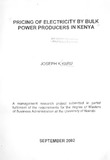| dc.description.abstract | This is a study on the electric energy sub-sector, which falls under the energy sector in Kenya.
The electric energy sub-sector has been undergoing restructuring since mid-1990s. A new
Electric Power Act 1997 came into effect replacing the then existing act that had been in use for
over 30 years. Under the new act, electric energy generation (bulk electric energy production)
was completely liberalized while the transmission and distribution functions were lumped together
under the Kenya Power and Lighting Company Limited (KPLC), the only retail company in the
country. The act also established an independent regulator, Electricity Regulatory Board (ERB)
whose role is to oversee the functioning of the industry and enforcement of policies of the
Government of Kenya (GoK), formulated the Ministry of Energy (MOE) to govern the industry.
The study was specifically aimed at finding out how bulk energy prices are developed by the five
bulk energy companies operating in Kenya, viz. Kenya Electricity Generating Company Limited
(KenGen), Iberafrica Power (EA) Limited, Tsavo Power Limited, Westmont Power Limited and
OR Power-4 Inc. During the study, however, the price of electric energy imported from Uganda
through the Uganda Electricity Transmission Company Limited (UETC) was also analyzed. The
study also aimed at finding out whether there were any differences in the methods adopted by
each of the companies in the development of prices.
The broad findings of the study were that each of the electric energy generating company has
signed a power purchase agreement (PPA) with the retail company, KPLC except KenGen which
is still trading with KPLC under an interim power purchase agreement (IPPA). Each PPA and the
IPPA have adopted a three tier pricing system comprising capacity charge, energy charge and
fuel cost. Capacity charge is meant to cater for the bulk energy companies' return on equity,
recouping of sunk costs, repayment of debt and interest, plant maintenance costs, remuneration
for the permanent staff and other fixed costs. This component of charge is payable to the bulk
energy company whether the company has sold energy or not on condition that the company
maintains the guaranteed capacity otherwise punitive financial penalties are applied. Bonuses of
up to 15% of guaranteed capacity are also allowed under the PPAs. Energy charge component is
only applicable in respect of sold energy and is essentially meant to cater for recovery of variable
costs, hence it is a function of energy sold covering items such as cost of spare parts, lubricants
and variable labour. Fuel cost is a pass-through component that finally ends up with electricity
consumer and is mainly influenced. by international price of oil, heat conversion rate and
efficiency of individual generators. | en |

